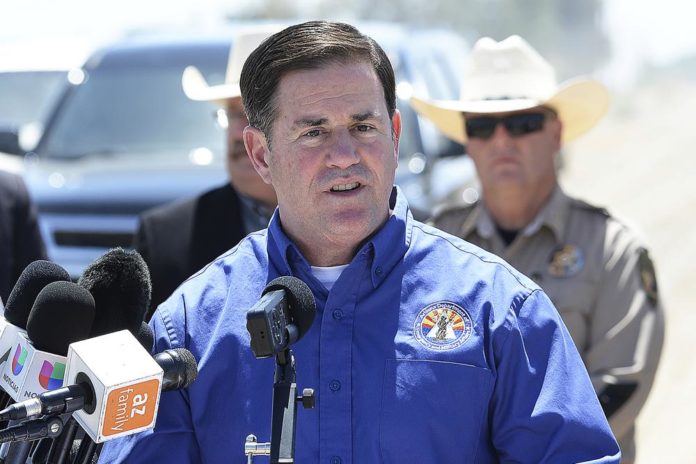
The Arizona Senate on Thursday pulled the plug on a plan to vote on a budget and instead adjourned until June 10 unless they break the impasse earlier on the $12.8 billion spending plan.
Republican Senate President Karen Fann announced Thursday afternoon that her hopes of getting all 16 Republican members to back the deal she reached with House Speaker Rusty Bowers and Gov. Doug Ducey had fallen through. Some members complained about too much spending while others worry the tax cuts are too large.
The House reached the same conclusion Wednesday, adjourning until June 10 unless they can reach a deal with their members sooner. With only a one-vote majority in each chamber and no Democratic support for the budget deal that includes a massive tax cut, Republicans could only lose one vote.
“We thought we were really, really close to getting a budget done today, head’s up, or head’s down, whichever,” Fann told the assembled senators. “And over the last less than 12 hours, we’re further apart now than we were. A lot of new requests, a lot of new demands.”
“So it would be futile for us to try and put this up,” she said. “We obviously need to get things back together again and figure out where we’re going to go from here.”
It had been clear all week that neither the House nor the Senate had the votes. But Fann had forged ahead, repeatedly saying she would have a vote Thursday.
Republican Sen. Paul Boyer of Glendale remained opposed, even as Fann worked on a series of amendments to try to shore up support. Boyer told The Associated Press Thursday morning that his concerns with the spending plan and its $1.9 billion in tax cuts are broad.
“I still think we need to pay down more on debt and gimmicks,” Boyer said. “I am concerned about the scope and the permanency of the tax cut.”
Boyer also said universities, community colleges, and education in general need more spending, making particular note of the 700,000 Arizona adults he said do not have a high school diploma or its equivalent.
“And then, of course, there’s the elephant in the room — we can’t hurt the cities,” Boyer said. “So, in other words, there’s a lot, there’s a lot that we still need to work on.”
Senate Democrats released a statement calling the budget stalemate and the Republican decision to stop work a “disservice to the people of Arizona who look up to us as leaders.”
“While Democrats are ready to fight for a budget that rebuilds, revitalizes, and reinvests in Arizonans, Republicans have decided to take a vacation instead of working with us to pass a people’s budget. When we return, they’ll continue forcing through a budget that completely ignores the critical needs of Arizonans, like investing in our schools, children’s health care, teacher pay, affordable housing, and more” in favor of tax cuts that mainly benefit the wealthy and big business, the statement said.
Boyer isn’t alone among Republicans, who narrowly control the Legislature, in voicing concerns for city finances. GOP Rep. Joanne Osborne of Goodyear said earlier this week she is worried that the tax cuts will affect cities and vowed to withhold her support in the House unless it is addressed.
A group that represents cities and towns is pushing for changes to address what it says will be a $280 million-a-year hit to tax revenue its members get as a share of the state income tax. The League of Arizona Cities and Towns is requesting an increase in the 15% share of income tax that cities now receive.
On the other side, fiscally conservative GOP members who said the budget has too much spending and oppose a tax exemption for veterans’ military pensions are holding out for major changes. That led to the House calling off a budget debate on Wednesday.
Bowers, the Republican House speaker, said in an interview that there is a way to satisfy the cities’ concerns.
“We are looking at holding harmless … cities for two to three years and then smaller rural communities, keeping them all as we move along,” Bowers said. “We have money to make it work.”
Bowers was less hopeful about his ability to get the members who oppose some of the spending and tax cuts on board, although he said he’s working at it.
“They’re just going to have to choose the vision, and we’ll see if we can work things out,” he said. “And we’re making a good stab at where we see legitimate opportunities to come together. Staff and members are working with them to try to bridge those gaps. But it’s up to them. If we can’t bridge, then we can’t bridge.”
Bowers was full of praise for many of his members, those he said were on “kind of an honor roll” and working for their districts and for a solid budget deal.
“There’s a bunch of people here who are really, really good team players, and I intend to let them know how much I appreciate it,” he said.
If lawmakers do not return by June 10, they will have less than three weeks to pass a new budget before state funding runs out at the end of the fiscal year. .The state’s 2022 fiscal year begins July 1.
Republished with the permission of the Associated Press.













